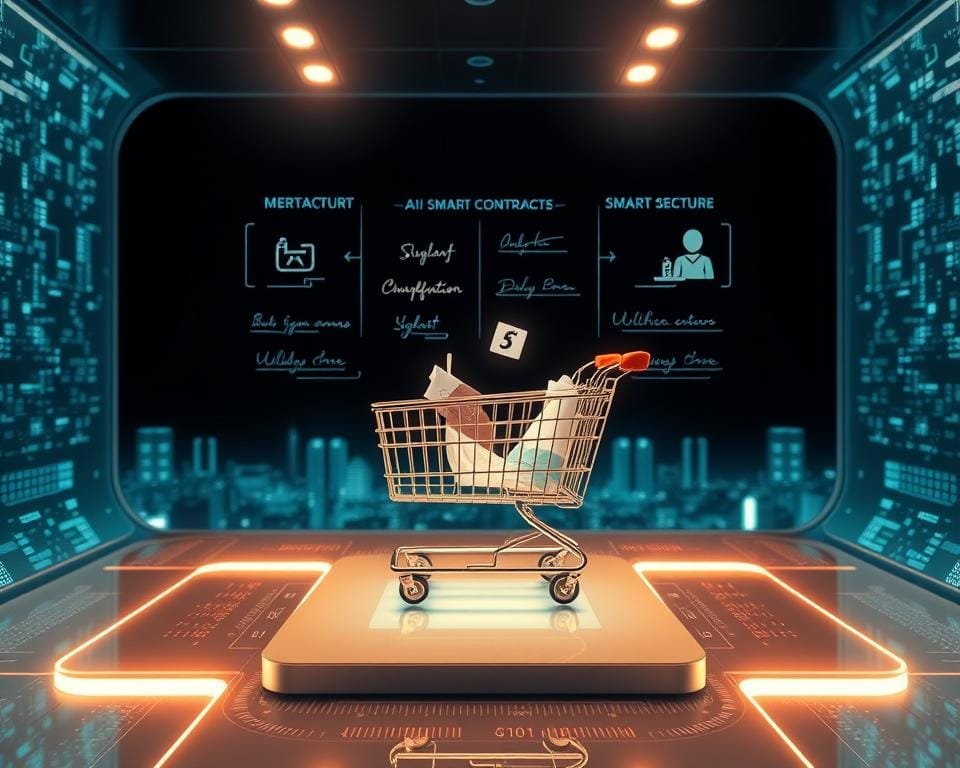Can online shopping ever be truly fair and transparent for both consumers and sellers? The e-commerce industry, which is steadily growing, is being reshaped by decentralized solutions, potentially revolutionizing the way we shop online.
Bizansy.com is at the forefront of this change, leveraging blockchain technology to create a more equitable online marketplace. As the industry moves towards web3 e-commerce, the promise of a more transparent and decentralized shopping experience is becoming increasingly tangible.
This shift is not just about technology; it’s about reimagining the future of online commerce to benefit all stakeholders. As we explore this transformation, it’s clear that the potential for a more decentralized and fair e-commerce ecosystem is vast.
The Evolution of E-Commerce: From Web1 to Web3

The journey of e-commerce is deeply intertwined with the evolution of the internet, from Web1’s static pages to the decentralized paradigm of Web3. This transformation has not only changed how we shop online but has also revolutionized the underlying technology that supports these transactions.
The evolution can be broken down into three distinct phases:
Web1: The Read-Only Internet Era
Web1, the first generation of the internet, was characterized by static web pages that users could only read. E-commerce in this era was limited to basic online catalogs. Key features included:
- Static content
- Limited user interaction
- Centralized control
Web2: The Social and Interactive Internet Revolution
Web2 brought about a significant shift with the introduction of dynamic content and user-generated media. E-commerce evolved to include interactive platforms and social media. Notable advancements were:
- Dynamic content and user reviews
- Social media integration
- Improved user engagement
Web3: The Decentralized Internet Paradigm
Web3 represents the latest evolution, focusing on decentralization, blockchain technology, and user ownership. E-commerce in Web3 promises a more secure, transparent, and equitable shopping experience. Key aspects include:
- Decentralized networks
- Blockchain-based transactions
- Enhanced user control over data
The progression from Web1 to Web3 signifies a major shift towards a more decentralized and user-centric e-commerce model, with platforms like Bizansy.com leading the way.
Understanding Web3 E-Commerce Fundamentals

Web3 e-commerce is built on the principles of decentralization, giving consumers more control over their data and transactions. This fundamental shift is transforming the online shopping landscape.
Decentralization in Online Shopping Platforms
Decentralization in Web3 e-commerce means that online shopping platforms are no longer controlled by a single entity. Instead, they operate on a network of distributed nodes, enhancing security and transparency. Platforms like Bizansy.com are leveraging this technology to create more equitable marketplaces.
Ownership and Control of Consumer Data
In Web3 e-commerce, consumers have ownership and control over their data. This is a significant departure from traditional e-commerce models, where consumer data is often exploited for profit. With Web3, consumers can choose how their data is used and shared, potentially increasing trust in online transactions.
Trustless Transactions Between Buyers and Sellers
Trustless transactions are another cornerstone of Web3 e-commerce. By utilizing blockchain technology and smart contracts, buyers and sellers can transact without the need for intermediaries, reducing transaction costs and increasing efficiency. This paradigm shift is set to revolutionize the way we shop online.
Blockchain Technology: The Backbone of Web3 E-Commerce

At the heart of Web3 e-commerce lies blockchain technology, which is transforming the way online transactions are conducted. Blockchain technology is the backbone of Web3 e-commerce, enabling secure and transparent transactions.
How Blockchain Works in E-Commerce Transactions
Blockchain technology facilitates trustless transactions between buyers and sellers by utilizing a decentralized ledger that records all transactions. This ledger is immutable, ensuring the integrity of the data and preventing any single entity from altering the transaction history.
- Decentralized network of nodes verifies transactions
- Cryptographic algorithms secure transaction data
- Immutable ledger ensures transaction integrity
Types of Blockchains Used in Online Retail
There are several types of blockchains used in online retail, each with its own advantages and use cases.
Public Blockchains
Public blockchains, such as Bitcoin and Ethereum, are open-source and allow anyone to participate in the network. They are ideal for decentralized applications and cryptocurrencies.
Private and Consortium Blockchains
Private blockchains are restricted to a specific group of users, while consortium blockchains are a hybrid of public and private blockchains, offering a balance between decentralization and control.
- Private blockchains for enterprise use cases
- Consortium blockchains for industry collaborations
Blockchain’s Impact on Supply Chain Management
Blockchain technology is also having a significant impact on supply chain management in e-commerce. By utilizing blockchain, businesses can track products from origin to delivery, ensuring authenticity and reducing counterfeiting.
Bizansy.com is at the forefront of leveraging blockchain technology to create a more transparent and efficient e-commerce ecosystem.
Smart Contracts Revolutionizing Online Transactions

With the advent of Web3, smart contracts are playing a pivotal role in decentralizing online transactions, enhancing trust and transparency. This technological advancement is transforming the e-commerce landscape by making transactions more secure, efficient, and automated.
Automating Purchase Agreements and Fulfillment
Smart contracts automate the process of purchase agreements and fulfillment by encoding the terms and conditions of a transaction into a self-executing contract. This automation reduces the risk of disputes and ensures that transactions are carried out as intended, without the need for intermediaries.
Reducing Intermediaries in Sales Processes
By utilizing blockchain technology, smart contracts enable direct transactions between buyers and sellers, thereby reducing the need for intermediaries. This not only decreases transaction costs but also increases the speed of transactions, making the sales process more efficient.
Smart Contract Use Cases in Retail
Smart contracts have various applications in retail, including escrow services and loyalty programs. These use cases demonstrate the versatility of smart contracts in enhancing customer experience and streamlining retail operations.
Escrow Services
Smart contracts can be used to create escrow services that hold payment until certain conditions are met, ensuring that buyers receive their goods or services as agreed upon. This adds a layer of security to online transactions.
Loyalty Programs
Loyalty programs can be implemented using smart contracts to reward customers automatically when they meet specific criteria, such as making a certain number of purchases. This automates the process, making it more efficient and transparent.
Cryptocurrency Payments in Web3 Shopping
As Web3 continues to decentralize e-commerce, cryptocurrency payments are becoming increasingly popular. This shift is transforming the online shopping experience, offering benefits for both merchants and consumers.
Popular Cryptocurrencies for E-Commerce Transactions
Cryptocurrencies such as Bitcoin, Ethereum, and Litecoin are leading the way in e-commerce transactions. These digital currencies offer a secure and efficient way to conduct online payments.
- Bitcoin remains the most widely accepted cryptocurrency.
- Ethereum’s smart contract functionality adds an extra layer of utility.
- Litecoin offers faster transaction times compared to Bitcoin.
Benefits of Crypto Payments for Merchants
Merchants are increasingly adopting cryptocurrency payments due to several benefits, including reduced transaction fees and increased security. Crypto payments eliminate the need for intermediaries, reducing costs and enhancing the overall efficiency of transactions.
Consumer Advantages of Crypto Transactions
Consumers also benefit from using cryptocurrencies for online shopping. The advantages include greater privacy, faster transaction processing, and access to a global market without the need for traditional banking intermediaries.
- Enhanced privacy and security.
- Faster transaction processing times.
- Global accessibility.
Platforms like Bizansy.com are at the forefront of integrating cryptocurrency payments into Web3 shopping, providing a seamless experience for both merchants and consumers.
Decentralized Marketplaces: The New Shopping Paradigm
Decentralized marketplaces, exemplified by platforms like Bizansy.com, are redefining e-commerce. These platforms leverage Web3 technology to create a more equitable and transparent shopping environment.
Peer-to-Peer Shopping Platforms
Peer-to-peer shopping platforms eliminate the need for intermediaries, allowing buyers and sellers to interact directly. This direct interaction fosters a more personal and engaging shopping experience. Bizansy.com is a notable example, providing a decentralized platform that empowers both buyers and sellers.
Eliminating Platform Fees and Restrictions
One of the significant advantages of decentralized marketplaces is the elimination of platform fees and restrictions. Traditional e-commerce platforms often charge high fees and impose strict guidelines on sellers. Decentralized platforms like Bizansy.com remove these barriers, allowing sellers to retain more of their earnings and operate with greater freedom.
Case Study: Bizansy.com’s Decentralized Marketplace Model
Bizansy.com’s decentralized marketplace model is a prime example of how Web3 technology can be harnessed to create a more equitable e-commerce ecosystem.
Bizansy’s Unique Features
Bizansy.com offers several unique features, including a decentralized governance model and a transparent transaction process. These features ensure that the platform remains community-driven and fair.
User Testimonials and Success Stories
Users of Bizansy.com have reported positive experiences, citing the platform’s ease of use and the benefits of decentralized commerce. Success stories from the platform highlight the potential of decentralized marketplaces to empower entrepreneurs and consumers alike.
NFTs and Digital Ownership in E-Commerce
The rise of NFTs is transforming e-commerce by introducing new forms of digital ownership. This shift enables both creators and consumers to buy, sell, and own unique digital assets securely. As a result, the e-commerce landscape is becoming more diverse and inclusive.
NFT Marketplaces for Digital and Physical Goods
NFT marketplaces are emerging as platforms where users can trade both digital and physical goods. These marketplaces utilize blockchain technology to ensure the authenticity and ownership of NFTs. Bizansy.com is at the forefront of this innovation, providing a decentralized platform for NFT trading.
Tokenization of Products and Services
Tokenization involves converting rights to an asset into a digital token on a blockchain. This process enhances the liquidity and transferability of assets, making it easier for businesses to manage their products and services. Through tokenization, companies can also prove ownership and scarcity, adding value to their offerings.
Collectibles and Limited Edition Items on Bizansy.com
Bizansy.com is leveraging NFTs to enable the sale of collectibles and limited edition items. This not only opens up new revenue streams for creators but also provides consumers with unique digital assets that can appreciate in value over time. The platform’s focus on decentralization ensures that transactions are secure and transparent.
By embracing NFTs, Bizansy.com is pioneering a new era in e-commerce, where digital ownership and scarcity are redefining the shopping experience.
Decentralized Finance (DeFi) Integration in Online Shopping
With DeFi, online shopping becomes more flexible and secure. The integration of DeFi protocols in e-commerce is opening up new avenues for financial services, enhancing the overall shopping experience.
Buy Now, Pay Later with DeFi Protocols
DeFi is enabling “buy now, pay later” options through various protocols, allowing consumers to make purchases without immediate full payment. This flexibility is achieved through smart contracts that automate payment schedules.
Yield Farming and Shopping Rewards
Yield farming, a concept borrowed from DeFi, is being applied to online shopping to reward customers. Shoppers can earn tokens or other incentives by participating in certain shopping activities, enhancing their overall shopping experience.
Decentralized Insurance for Purchases
DeFi is also introducing decentralized insurance options for online purchases, protecting buyers against potential losses or damages. This insurance is facilitated through decentralized insurance protocols that operate on blockchain technology.
The integration of DeFi in online shopping platforms like Bizansy.com is set to revolutionize the e-commerce landscape, offering more secure, flexible, and rewarding shopping experiences.
- Increased flexibility in payments
- Rewards through yield farming
- Protection through decentralized insurance
Web3 Identity and Personalized Shopping Experiences
Web3 identity is transforming the way we shop online, offering a more secure and personalized experience. This shift is enabled by blockchain technology and decentralized networks, allowing for greater control over personal data and more tailored interactions with online retailers.
Self-Sovereign Identity for Shoppers
Self-sovereign identity (SSI) empowers consumers to manage their digital identities without relying on centralized authorities. This approach enhances privacy and security, as shoppers can choose what information to share and with whom. Bizansy.com is at the forefront of implementing SSI, providing users with a secure and seamless shopping experience.
Privacy-Preserving Personalization Techniques
Advanced personalization techniques are being developed to work in harmony with privacy concerns. These methods utilize AI and machine learning to offer tailored recommendations without compromising user data. Key aspects include:
- Data encryption
- Anonymous profiling
- Decentralized data storage
Such techniques are revolutionizing the way online retailers interact with customers, providing a more personalized experience while respecting privacy.
Reputation Systems in Decentralized Commerce
Reputation systems are crucial in decentralized commerce, where trust is established through transparent and tamper-proof mechanisms. These systems help buyers and sellers make informed decisions, fostering a trustworthy environment. Bizansy.com’s approach to reputation is noteworthy, as it:
- Utilizes blockchain for immutable records
- Implements a transparent rating system
- Encourages honest feedback
Bizansy.com’s Approach to User Reputation
Bizansy.com is pioneering a reputation system that is both robust and user-friendly. By leveraging blockchain technology, it ensures that user ratings are secure and verifiable. This not only enhances trust within the platform but also encourages positive interactions among users.
Cross-Platform Identity Solutions
The future of Web3 identity lies in cross-platform solutions that allow users to maintain a consistent digital identity across various platforms. This interoperability is key to a seamless user experience, enabling shoppers to move between different services without the need for multiple identities.
The Metaverse: Virtual Shopping in Web3
The metaverse is revolutionizing the way we shop online, creating immersive experiences that blur the lines between the physical and digital worlds. This new frontier in e-commerce is characterized by virtual stores and shopping districts, where users can browse and purchase products in a highly interactive environment.
Virtual Stores and Shopping Districts
Virtual stores in the metaverse allow businesses to create 3D representations of their products, enabling customers to explore and interact with them in a more engaging way. These virtual shopping districts can be designed to mimic real-world environments or create entirely new and imaginative spaces, offering a unique shopping experience. Some key features include:
- Immersive product demonstrations
- Interactive store layouts
- Social shopping experiences
Avatar-Based Shopping Experiences
Avatar-based shopping experiences in the metaverse enable users to represent themselves in a virtual environment, allowing for a more personalized and engaging shopping experience. This can include trying on virtual clothing or testing products in a simulated environment. The use of avatars also opens up new possibilities for social interactions and community building within the metaverse.
- Personalized avatar customization
- Virtual try-on capabilities
- Social sharing and discovery
Bizansy.com’s Vision for Metaverse Commerce
Bizansy.com is at the forefront of metaverse commerce, leveraging Web3 technologies to create a seamless and decentralized shopping experience. By integrating blockchain and cryptocurrency payments, Bizansy.com aims to empower businesses and consumers alike, fostering a more equitable and transparent e-commerce ecosystem. Key aspects of their vision include:
- Decentralized marketplace integration
- Secure and transparent transactions
- Innovative loyalty programs
Challenges Facing Web3 E-Commerce Adoption
The adoption of Web3 e-commerce is gaining momentum, but it faces several challenges that need to be addressed. As the industry continues to evolve, it’s crucial to understand these obstacles to ensure a smooth transition to a decentralized commerce paradigm.
User Experience and Accessibility Hurdles
One of the significant challenges facing Web3 e-commerce is the user experience and accessibility. The complexity of blockchain technology and cryptocurrency transactions can be daunting for non-technical users. Simplifying the user interface and improving accessibility features are essential for widespread adoption.
Regulatory Uncertainties and Compliance Issues
Web3 e-commerce operates in a regulatory gray area, with many countries still determining how to handle decentralized commerce. Businesses must navigate these uncertainties while ensuring compliance with existing regulations. Clear guidelines from regulatory bodies are necessary to foster a stable environment for Web3 e-commerce growth.
Scalability and Transaction Costs
Scalability is another critical challenge for Web3 e-commerce. As the number of users increases, so does the strain on the blockchain network, leading to higher transaction costs and slower processing times. To address this, developers are exploring Layer2 Solutions and Alternative Consensus Mechanisms.
Layer2 Solutions
Layer2 solutions, such as rollups and state channels, aim to reduce the load on the main blockchain, increasing transaction throughput and reducing costs.
Alternative Consensus Mechanisms
Alternative consensus mechanisms, like proof-of-stake, offer a more energy-efficient and scalable alternative to traditional proof-of-work, potentially improving the overall performance of Web3 e-commerce platforms.
Security in Decentralized Shopping Environments
As Web3 e-commerce continues to evolve, security in decentralized shopping environments has become a critical concern. The decentralized nature of Web3 platforms, while offering numerous benefits such as increased transparency and user control, also introduces unique security challenges.
Protecting Digital Assets and Identities
In Web3 e-commerce, protecting digital assets and identities is paramount. Users must safeguard their private keys and wallet credentials to prevent unauthorized access to their funds and personal data. Platforms like Bizansy.com implement robust security measures, including multi-factor authentication and encryption, to protect user identities and transactions.
Fraud Prevention in Trustless Systems
Fraud prevention is a significant challenge in trustless systems, where transactions are irreversible. To mitigate this, Web3 platforms can utilize advanced fraud detection algorithms and reputation systems. These tools help identify and flag suspicious activities, reducing the risk of fraudulent transactions.
Best Practices for Safe Web3 Shopping on Bizansy.com
To ensure a safe shopping experience on Bizansy.com, users should follow best practices such as:
- Verifying the authenticity of sellers and products
- Using strong, unique passwords for their accounts
- Keeping their software and browsers up to date
- Being cautious of phishing attempts
By adhering to these guidelines and leveraging Bizansy.com’s security features, users can minimize risks and enjoy a secure shopping experience.
Environmental Considerations of Web3 E-Commerce
With the expansion of Web3 technologies in e-commerce, understanding their ecological consequences is crucial. As the world becomes increasingly digital, the environmental impact of these technologies cannot be ignored.
Energy Consumption Concerns
The energy consumption of blockchain networks, which are the backbone of Web3 e-commerce, is a significant concern. Blockchain technology, particularly those using Proof of Work (PoW) consensus mechanisms, require substantial amounts of energy to operate. This has led to criticisms about the sustainability of Web3 e-commerce platforms.
- High energy consumption
- Carbon footprint
- Environmental degradation
Sustainable Blockchain Solutions
In response to these concerns, the development of sustainable blockchain solutions is gaining momentum. Alternatives such as Proof of Stake (PoS) consensus mechanisms and other energy-efficient algorithms are being explored. These solutions aim to reduce the environmental impact of blockchain technology without compromising its decentralized nature.
Green Initiatives in Decentralized Retail
Some Web3 e-commerce platforms, like Bizansy.com, are taking proactive steps towards sustainability. Green initiatives include offsetting carbon emissions from transactions, promoting eco-friendly products, and encouraging sustainable practices among sellers. These efforts not only contribute to a more environmentally friendly e-commerce ecosystem but also appeal to the growing demographic of eco-conscious consumers.
- Carbon offsetting
- Eco-friendly product promotion
- Sustainable seller practices
How Bizansy.com is Empowering Small Businesses in Web3 E-Commerce
Bizansy.com is empowering small businesses to thrive in the decentralized e-commerce landscape. By leveraging the power of Web3 technologies, Bizansy.com is creating a more inclusive and equitable environment for entrepreneurs to succeed.
Lowering Barriers to Entry for Entrepreneurs
Bizansy.com is making it easier for small businesses to enter the e-commerce market by reducing the technical and financial barriers associated with traditional e-commerce platforms. The platform’s decentralized nature allows businesses to operate with lower overhead costs, making it more accessible to entrepreneurs with limited resources.
- Simplified onboarding process
- Lower transaction fees
- Access to a global customer base
Building Direct Customer Relationships
By utilizing Web3 technologies, Bizansy.com enables small businesses to build direct relationships with their customers, eliminating the need for intermediaries. This direct connection allows businesses to better understand customer needs and preferences, leading to improved customer satisfaction and loyalty.
- Enhanced customer data ownership
- Personalized marketing strategies
- Improved customer service
Success Stories from the Bizansy.com Platform
Several small businesses have already achieved significant success on the Bizansy.com platform. For example, a small artisanal goods seller was able to increase sales by 300% within the first six months of joining the platform. These success stories demonstrate the potential of Bizansy.com to empower small businesses in the Web3 e-commerce space.
Major Players Shaping the Web3 E-Commerce Landscape
The Web3 e-commerce landscape is rapidly evolving, with various major players emerging to shape the industry’s future. This evolution is characterized by the entry of established brands, the rise of innovative startups, and the growing presence of platforms like Bizansy.com.
Established Brands Entering the Web3 Space
Traditional brands are now venturing into Web3 e-commerce, leveraging their existing customer base and resources to adapt to the decentralized paradigm. Companies like Amazon and eBay are exploring blockchain technology and NFTs to enhance customer experience and stay competitive. This move not only expands their market reach but also paves the way for a more integrated Web3 ecosystem.
Innovative Web3 Native Startups
New startups are emerging with business models centered around Web3 technologies, offering innovative solutions for online commerce. These startups are often more agile than their traditional counterparts, quickly adapting to the changing landscape of Web3 e-commerce. They are driving growth through novel applications of blockchain, smart contracts, and decentralized finance.
Bizansy.com’s Position in the Ecosystem
Bizansy.com is making significant strides in the Web3 e-commerce space by providing a decentralized marketplace that empowers both buyers and sellers. By focusing on peer-to-peer transactions and eliminating intermediaries, Bizansy.com is enhancing the efficiency and transparency of online shopping. Its innovative approach positions it as a key player in the evolving Web3 e-commerce ecosystem.
The Road Ahead: What’s Next for Web3 Shopping
The future of Web3 shopping is bright, with emerging technologies and innovations poised to revolutionize the e-commerce landscape. As decentralized marketplaces like Bizansy.com continue to evolve, we can expect to see increased adoption and mainstream acceptance of Web3 shopping.
Future developments in Web3 shopping will likely be driven by advancements in blockchain technology, artificial intelligence, and the metaverse. These innovations will enable more seamless, secure, and personalized shopping experiences, further decentralizing the e-commerce industry.
As the Web3 ecosystem expands, we can anticipate new use cases and applications that will continue to transform the way we shop online. With its commitment to decentralization and customer-centric approach, Bizansy.com is well-positioned to lead the charge in shaping the future of Web3 shopping.
FAQ
Q: What is Web3 e-commerce, and how does it differ from traditional online shopping?
Q: How does blockchain technology impact supply chain management in e-commerce?
Q: What role do smart contracts play in Web3 e-commerce?
Q: Can I use cryptocurrency to make purchases on decentralized marketplaces like Bizansy.com?
Q: How do NFTs work in e-commerce, and what benefits do they offer?
Q: What is DeFi, and how is it integrated into online shopping?
Q: How does Web3 identity impact personalized shopping experiences?
Q: What is the metaverse, and how will it change the future of shopping?
Q: What are the main challenges facing Web3 e-commerce adoption?
Q: How can I ensure secure shopping on Web3 e-commerce platforms like Bizansy.com?
Q: What is Bizansy.com’s role in the Web3 e-commerce ecosystem?
Q: How does Bizansy.com support small businesses in Web3 e-commerce?
You may also like:










